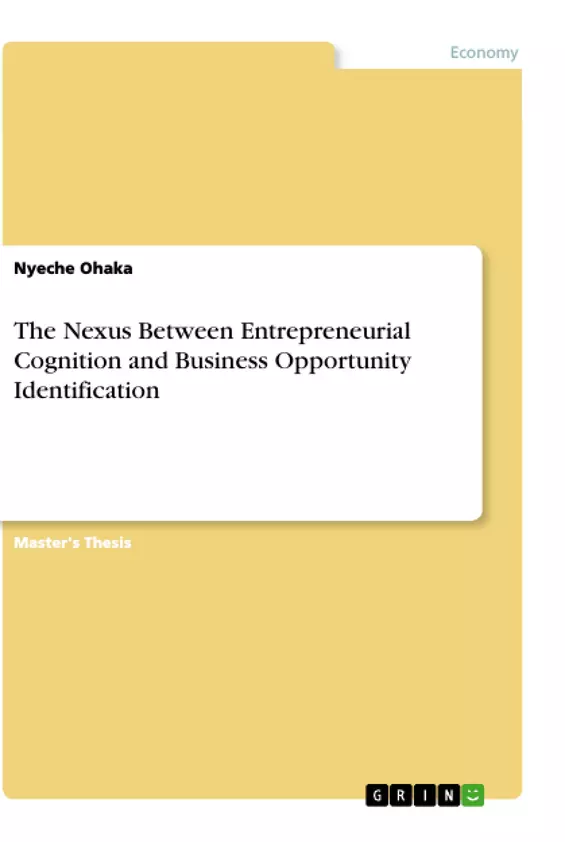The purpose of this study was to examine how entrepreneurial cognition development elates to post-graduate students’ business opportunity identification in Rivers State Universities. Specifically, the study sought to: Examine how self-efficacy relates with post-graduate students’ business opportunity identification in Rivers State Universities, how heuristic-based logic relates with post-graduate students’ business opportunity identification in Rivers State University, how individual perceptual process relates with post-graduate students’ business opportunity identification in Rivers State Universities, how entrepreneurial expertise relates with post-graduate students’ business opportunity identification in Rivers State Universities und how effectuation relates with post-graduate students’ business opportunity identification in Rivers State Universities.
The following research questions were posed to guide the study: How does self-efficacy relate with post-graduate students’ business opportunity identification in Rivers State Universities and how does heuristic-based logic relate with post-graduate students’ business opportunity identification in Rivers State Universities? How does individual perceptual process relate with post-graduate students’ business opportunity identification in Rivers State Universities, how does entrepreneurial expertise relate with post-graduate students’ business opportunity identification in Rivers State Universities and how does effectuation relate with post-graduate students’ business opportunity identification in Rivers State Universities?
Inhaltsverzeichnis (Table of Contents)
- Chapter One: Introduction
- 1.1 Background to the Study
- 1.2 Statement of the Problem
- 1.3 Purpose of the Study
- 1.4 Research Questions
- 1.5 Hypotheses
- 1.6 Scope of the Study
- 1.7 Significance of the Study
- 1.8 Operational Definition of Terms
- Chapter Two: Literature Review
- 2.1 Concept of Entrepreneurship
- 2.2 Entrepreneurial Cognition
- 2.3 Business Opportunity Identification
- 2.4 Relationship between Entrepreneurial Cognition and Business Opportunity Identification
- Chapter Three: Research Methodology
- 3.1 Research Design
- 3.2 Population of the Study
- 3.3 Sample and Sampling Technique
- 3.4 Research Instruments
- 3.5 Validity and Reliability of Instruments
- 3.6 Data Collection Procedure
- 3.7 Data Analysis Procedure
- Chapter Four: Presentation, Analysis and Interpretation of Data
- 4.1 Presentation of Data
- 4.2 Data Analysis
- 4.3 Interpretation of Results
- Chapter Five: Summary, Conclusion and Recommendations
- 5.1 Summary of Findings
- 5.2 Conclusion
- 5.3 Recommendations
Zielsetzung und Themenschwerpunkte (Objectives and Key Themes)
This dissertation investigates the relationship between entrepreneurial cognition and post-graduate students' business opportunity identification in Rivers State Universities. It aims to explore how entrepreneurial cognition factors, such as self-efficacy and heuristic-based logic, influence the ability of students to identify and capitalize on business opportunities. The study seeks to provide insights into the cognitive processes involved in opportunity recognition and to recommend ways to enhance entrepreneurial competency among post-graduate students.
- Entrepreneurial Cognition
- Business Opportunity Identification
- Relationship between Entrepreneurial Cognition and Business Opportunity Identification
- Entrepreneurship Education Curriculum
- Post-Graduate Students in Rivers State Universities
Zusammenfassung der Kapitel (Chapter Summaries)
Chapter One provides a comprehensive overview of the research topic, outlining the background, problem statement, purpose, research questions, hypotheses, scope, significance, and definition of terms. Chapter Two delves into the theoretical framework, reviewing relevant literature on entrepreneurship, entrepreneurial cognition, business opportunity identification, and the existing relationship between these concepts. Chapter Three details the research methodology employed, including the research design, population, sample, instruments, validity and reliability of instruments, data collection procedures, and data analysis methods. Chapter Four presents, analyzes, and interprets the collected data, using statistical techniques to examine the relationship between entrepreneurial cognition and business opportunity identification.
Schlüsselwörter (Keywords)
The key terms and concepts explored in this dissertation include entrepreneurial cognition, self-efficacy, heuristic-based logic, business opportunity identification, post-graduate students, entrepreneurship education, and Rivers State Universities.
Frequently Asked Questions
What is the central theme of this study?
The study examines the relationship between entrepreneurial cognition (how entrepreneurs think) and their ability to identify business opportunities.
Who were the participants in this research?
The research focused on post-graduate students at universities in Rivers State, Nigeria.
What specific cognitive factors were investigated?
The study looked at self-efficacy, heuristic-based logic, individual perceptual processes, entrepreneurial expertise, and effectuation.
Why is self-efficacy important for business opportunity identification?
The study analyzes how a student's belief in their own capabilities (self-efficacy) relates to their success in spotting and acting on potential business ventures.
What is the practical significance of this research?
It provides insights for improving entrepreneurship education curricula to better develop the cognitive competencies of future business leaders.
What methodology was used in the dissertation?
The study employed a structured research design involving sample surveys, statistical data analysis, and the testing of specific hypotheses.
- Quote paper
- Nyeche Ohaka (Author), 2022, The Nexus Between Entrepreneurial Cognition and Business Opportunity Identification, Munich, GRIN Verlag, https://www.grin.com/document/1184075



